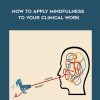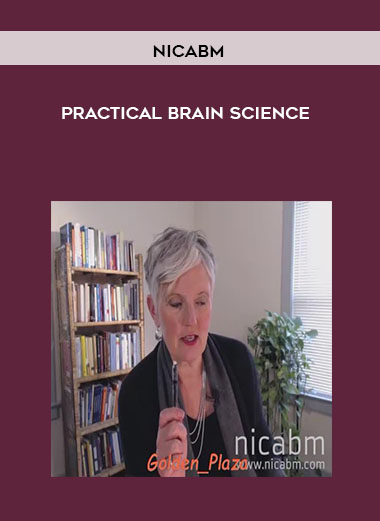NICABM – Practical Brain Science
$397.00 Original price was: $397.00.$64.00Current price is: $64.00.
Proof of item:
If the Brain Can Change, Our Patients’
Lives Can Change.
Here’s How to Harness the Power of Neuroplasticity to
Enable These Changes to Happen
And in nearly every clinical circumstance, no matter your objectives, a more fit brain can benefit almost any patient.
It can help them think more clearly, develop greater focus, and manage reactive emotions.
But there’s so much information (with more coming out every day), and few of us are neuroscientists.
So – what if you could cut through all of the theory and the thousands of research articles to quickly identify specific interventions that could rewire your patients’ brains and change their lives?
In this program we’ll boil down the latest developments to clear, simple principles you can use after just minutes of study.I’ll bring in 6 of my colleagues to show you specific ways you can use neuroplasticity to bring about lasting change in your clients’ lives.
If we want to help them think more clearly, achieve greater focus, manage reactive emotions, and help them experience so many other benefits, showing patients how to change and strengthen their brains may be the first and most crucial step.
Get 6 Webinars with Fresh Ideas and Interventions That Can Change Your Clients’ Lives:

Strengthening Focus: Why Concentration Can Make the Brain More Powerful
Daniel Goleman, PhD
Author of Focus: The Hidden Driver of Excellence
- How to Help Your Clients Avoid the Number One “Distractor Circuit” in the Brain that Derails Concentration
- The Link between Mindfulness and Cognitive Control (and How to Strengthen It)
- What the Brain Is Actually Doing When People Think They’re Multitasking
- Maintaining Concentration Amid Distractions: 4 Strategies for Better Focus
- The 3 Kinds of Attention that Every Good Leader Needs to Know So That They Can Encourage People to Create Lasting Change

The Brain in Love: The Neurobiology of Romance
Helen Fisher, PhD
Author of Why Him? Why Her?: How to Find and Keep Lasting Love
- The Similarity between Romantic Love and Addiction
- Why Novelty Can Help People Fall in Love Again after Rejection
- Rejection and the Brain: What Brain Scans Reveal about Healing after a Break-Up and How to Use This to Help Patients Cope with Loss
- How to Increase Oxytocin Naturally and Help Your Clients Form Deeper Attachment Bonds with their Partners
- What’s Happening in the Brain at Different Stages of Love
- Tools to Break Free from Destructive Romantic Attachments

Epigenetics: What Really Controls Genes and Why Your Patients Don’t Have to Be Victims of Their DNA
Bruce Lipton, PhD
Author of The Biology of Belief: Unleashing the Power of Consciousness, Matter, & Miracles
-
- How Fear and Negativity Play a Role in Genetics and Why It’s so Important for Healing
- How Experiences Affect Cells, DNA, and the Brain’s Development
- Why Genes Do What They Do: From Experience, to Brain, to Biology
- The Brain during the First 7 Years of Life
<liProgramming the Brain In Utero: Why “Emotional Chemistry” Is Important to Development

The Neurobiology of the Adolescent Brain: Why Understanding the Young Adult Brain Can Help Practitioners Better Serve Patients of All Ages
Daniel Siegel, MD
Executive Director of the Mindsight Institute, Co-Director of UCLA’s Mindful Awareness Research Center, author of Brainstorm: The Power and Purpose of the Teenage Brain
- Why Adolescents May Be the Most Creative and Courageous Individuals in Our Human Family
- The Fundamental Change in the Brain that May Be Behind Risky Adolescent Behavior
- An Adult’s Limbic System and Brain Stem Work Together to Help Them Get Motivated, but a Teenager’s Brain Is Different – Why Knowing That Is Important for Treatment
- Why Certain Psychiatric Disorders Like Schizophrenia, Bipolar Disorder, and Addiction Often Surface during Adolescence

Happiness and Neuroplasticity: Simple Strategies That Can Help Patients Rewire Their Brain for a More Rewarding and Fulfilling Life
Rick Hanson, PhD
Author of Hardwiring Happiness: The New Brain Science of Contentment, Calm, and Confidence
- How to Use Neuroplasticity to Transform a Reactive, Negative Brain into a Responsive, Productive One
- The Importance of Novelty for Neuroplasticity: Why New Experiences Have Such a Transformative Effect on Your Patients’ Brains
- The 5 Factors that Help Learning Take Hold and How They Promote Neuroplasticity
- How to Turn Positive Experiences into Lasting Brain Change
- How to Teach Your Patients to Rewire Their Brain For More Positive Experiences

Food, Hormones, and the Brain: Essential Ways to Balance the Brain for Optimal Health
Daniel Amen, MD
Medical Director of Amen Clinics, Inc., New York Times bestselling author of Unleash the Power of the Female Brain
- Hormones and How They Can Strengthen the Nervous System
- What Sugar Does to the Brain and How It Can Harm a Person’s Sex Life
- The 5 Pre-wired Strengths of the Female Brain
- The “Worry Curve” and Why Some Anxiety May Be Essential to Wellness
- Progesterone: The Brain’s “Natural Valium” and Why It Is So Important for Easing Anxiety
1 review for NICABM – Practical Brain Science
| 5 star | 100 | 100% |
| 4 star | 0% | |
| 3 star | 0% | |
| 2 star | 0% | |
| 1 star | 0% |
Sorry, no reviews match your current selections
Q & A
Related products
Personal Development
Personal Development
Personal Development
Personal Development
Personal Development
Cameron Blas – Filming And Editing Mastery With Final Cut Pro X
Personal Development
Personal Development
Personal Development
















A++ | NICABM – Practical Brain Science